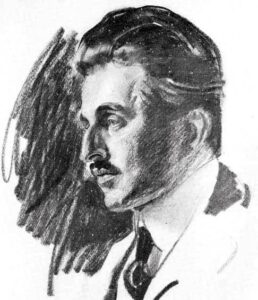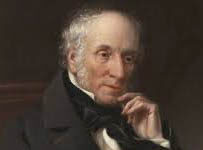Ameen Rihani: His Life and Humanist Vision
Ameen Rihani His Life and Humanist Vision
Ameen Rihani: His Life and Humanist Vision
Brief Life Sketch
Ameen Rihani (1876- 1940), was a root-conscious humanist writer who advocated the introduction of modernism (especially Western culture) in the Arab World. He was born in Freike (in modern-day Lebanon) on November 24, 1876. Rihani was one of six children and the oldest son of a Lebanese raw silk manufacturer, Fares Rihani. At the age of eleven, he was sent to the United States. His schooling began there and learned the rudiments of the English language. In the meantime, his father and uncle established themselves as merchants in a small cellar in lower Manhattan and facing the need for an assistant in their business they took away the boy from school and made him the chief clerk, interpreter and book-keeper of the business.
During this time, Ameen made acquaintance with American and European writers. He eventually became familiar with the writings of Shakespeare, Hugo, Darwin, Huxley, Spencer, Whitman, Tolstoy, Thoreau, Emerson and some others. Ameen had a natural talent for eloquent speaking. Thence he took up his pen in his hand and began writing. He wrote both in English and Arabic.
Literary Career and Humanistic Vision
As a writer, he was a humanist and his whole endevour was to awaken the East to the light of western modernity. Most of his writings are replete with his national thinking and humanist vision. We can enumerate his National Thinking and Humanist Vision as follows:
His National thinking and humanist vision are, to say in a brief phrase, the two sides of the same coin. But he, as a humanist, has no separate entity; it has taken birth and evolved within his thoughts concerning the welfare of the Arab World.
Ameen Rihani repeatedly called upon his compatriots to follow a life commitment to the Arab homeland, culture and world society. He commended his humanism and dialectical identity to his Arab contemporaries. Rihani insisted on embracing this identity to counter his feeling of being unprotected as a Christian Lebanese in the Arab World and to avoid the loss of well-defined as an Arab citizen of the world. Rihani’s loyalty is not to only his homeland but to the greater Arab land and through it, he dedicated himself to serving humanity. Rihani adopted his humanist outlook as a positive response to trans-culture and often painful formation in two distinct worlds- East and West. His life and activities reflect his tireless endeavour to balance his East-West belongings in a dynamic association that aimed at bringing both and for the sake of humanity. His vision of a humanist is the outcome of such endevour.
Rihani is humanist in two senses–one is universal and the other is rational. Rihani wished to see the Arabs contribute to human civilization and play a role on the world stage. He was committed to seeing a new Arab society on rational and universal principles of human progress. He was the first Syrian-Lebanese immigrant to force his own way into the world of intellectuals. His early published writings in Arabic convey his rebellion and reflects his inner struggle with the tension between two cultures. The initial contact with the West proved to be crucial in shaping Rihani’s intellectual development and personal identity. His keenness for self-education and Western sources obliged him to come to terms with the cultural conflicts between the two different worlds.
His interaction with the Arab community in New York and Arab societies in Lebanon, Syria and Arabia alerted him to see the issue of Arab weirdness, ignorance and religious fanaticism. His national thinking concerns co-existed with universal concerns including the global conflict of the western culture and its materialism. For his national-universal commitment, he became known as ‘Fayasuful Al-Freike’ (the philosopher of Freike) in his lifetime and after his death. Rihani deeply involved with the aspects of Western culture not only through his wide range of reading but also through his own writing in English.
His comprehensive reading in Arabic deepened his appreciation of the Arabic heritage. His first translated work was the translation of the works of Abu- Ala- Al Ma’aari. And such he became the leading representative and interpreter of Eastern culture in the West. His ‘Book of Khalid’ is the foundation of a new trend within the Lebanese –American culture, which was the first book ever authored by an Arab. It was also Rihani’s best expression of his aspiration.
His genuine interest in the Arab cause gained him the confidence of the Arab rulers and helped him play an important role in creating some common interest among them. On the other hand, as the product of two civilizations-Eastern and Western, he was afforded with confidence to criticize certain stages and aspects of underdevelopment and backwardness in Arab life. He proudly described the glory of Arabia and its people. He fairly criticized them and called upon them to unite and adopt modern means of progress in order to face the challenge of the modern world.
Rihani came to believe that Arab nationalism would be the salvation of the Arabs and that unity would be their means of redressing the injustices of colonialism and persistent western expansionism because of his realism and approach. His Arab nationalism was based on Syria or Lebanese unity and thus he called for a broader cultural, geographical, and political unity among all tribes of Arab. Rihani’s broad vision surrounded a united Peninsula, Iraq and geographical Syria including Lebanon and Palestine.
Of course, Rihani shared many ideas with his contemporary nationalists. He considered that geography, history, language, and culture are essential elements of Arab nationalism. Rihani was a historian with a dialectical knowledge of Arab history. He was a loyal nationalist without a romantic attitude toward the past. He did not overestimate the Arab national trends in relation to that of humanity as a whole. On the contrary, Rihani was the first Arab intellectual to deal critically while learning from its positive aspects.
He always took pride in the Arab contribution to world civilization and he pressured that the Arabs were entitled to their share of the glory of the civilization just as the Europeans. He believed that the Arabs could be able to achieve progress with today’s science and that is possible only by combining the positive values of Western civilization. There were two elements in the dynamic culture of the nation. One was spiritual aspiration from the past and the other was material advancement scientifically enlightened future that would create a new society. A nation would be completed with the powers of the West and play an effective role on the world stage. Rihani’s deep estimate and pride in the Arabic cultural heritage led him to view it, religion aside, as a binding source of the whole Arabian Peninsula. According to him, language takes priority over religion. Naturally Arabic was his first identity. Of course, Rihani acknowledged the Islamic dimension in Arabic culture which was upheld by the Muslims as well as by the Christians. He said, “The Arabs were before Islam and before Christianity. The Christians as well as the Muslims should know that Arabism (Al- Uruba) is before everything and above everything.”
Rihani was one of the pioneers of the modern secular Arab nationalists while not completely rejecting the relation between Islam and Arabness. He always insisted that Arabism was distinct and went beyond Islam to embrace all Arab Muslims and non-Muslims, even those who live outside the peninsula. Liberation from foreign occupation and domination was for him the highest political and national interest which more than any blood or cultural ties would determine the people’s will and desire to live together as one nation. He argued that the people in Lebanon and Syria share a common interest in getting rid of the mandate of outsiders. Rihani thus highlighted the performance of will and aspiration in determining Arab identity and unity which was a remarkable novelty in the Arab nationalist discourse.
He advocated the development of a just and civil political institution: a solid infrastructure of schools, colleges, hospitals, water wells, facilities for oil and mineral extraction, modern means of communication and productive human resources. Ameen Rihani was a pioneer of democracy and human rights in the modern Arab world. He insisted on modern democratic government, secular national education, economic development and liberation from foreign bonds both in culture and civil rights. These conditions were essentially related to his ideas of progress, democracy, justice and freedom which Rihani emphasized as basic human rights that are indispensable for the building of the new Arab nation. Despite his criticism of the abuse of western democracy, Rihani still believed that constitutional parliamentary civil rule is better than other forms of government. He realized that Arabia was in need of a civil government but he supported constitutional monarchy in Arab Peninsula. Rihani believed that a monarch – a wise, just and paternal leader- suited Arabia more than a republican government. The people of Arabia had developed a keen emotional interest in the existence of monarchy and paid homage to the rulers’ paternal authority. Moreover, Arabia at the time laced the educational means to cause a sudden change in its political culture. Hence we find a distinct pragmatic accent in Rihani.
Ameen Rihani wrote in favor of the world which he saw to be striving for freedom, justice and peace. His world was the Arab world, though not rich in power but rich in resources and heritage, the contribution of which to the world civilization was immense. He believed that the Arab nation should adhere to progressive aims and methods. Its national secular education should expand to embrace modern science and philosophy as he thought it would develop the new Arab nationalism into universal nationalism. In its dynamic vision, he expected the Arab nation to borrow certain western values in particular modernization. He insisted on the matter that the Arab nation would not survive unless it adopts progressive initiation in all matters of development. Rihani insisted that the Arab nation should have evolved a positive relationship with the Western and Eastern nations, a relationship without any sense of superiority and envy. He glorifies saying that the Arab nation is a peace-loving nation that would not tolerate any foreign interference in their home affairs. He fought continuously against political oppression and social injustice by the western powers upon the Arabs, especially in Lebanon. Rihani personally wrote in 1931 and addressed to his people and to his companions that self-determination is necessary to get people’s rights in hand. He wrote, “Fight against the mandatory government and oppressive government.” By urging jihad upon his people, Rihani certainly did not declare a ‘Holy War’ against the West in the sense some Middle East experts interpret the word today. Rihani certainly favored the spiritual struggle and peaceful resistance .including revolt, boycott and going on strike. He even welcomed imprisonment for the sake of rights and freedom before the declaration of Human Rights in 1948.
Ameen Rihani defined the Arab Renaissance (Al-Nahda al-Arabia) in three words as: Unity, Peace and Education. These concepts are independent. One cannot be achieved without the other. And without inter-Arab and Arab-West co-operation. Rihani argued that the Arab nation should first be united and continuously should work towards this aim. He did not hesitate to criticize the Arabs in order to stimulate their progress and unity. Rihani’s concept of Arab unity was a realistic programme for a real society which was meant to be a real democracy–a just society but not necessarily a complete imitation of Western democracy. He aimed at building a modern Arab in harmony with World Society. He was confident that the spirit of modern Arabism portend an opening to modern scientific inquiry and democratic forms of government. Rihani believed that with self-confidence in its inherent moral values, the Arab nation would reach the patriotic national and the universal summit.
Thus we can come to the conclusion that Ameen Rihani was, from head to foot a national thinker of the Arab World who struggled throughout his life to see a unified modern scientifically developed Arab nation and within this, his humanist vision had got evolved as parallel to his national thought. 0 0 0. Ameen Rihani, Ameen Rihani
Ameen Rihani His Life and Humanist Vision
N. B. This article ‘Ameen Rihani His Life and Humanist Vision’ originally belongs to the book entitled ‘Gleaned Essays‘ by Menonimus. Ameen Rihani, Ameen Rihani
Ameen Rihani
Books of Composition by M. Menonimus:
- Advertisement Writing
- Amplification Writing
- Note Making
- Paragraph Writing
- Notice Writing
- Passage Comprehension
- The Art of Poster Writing
- The Art of Letter Writing
- Report Writing
- Story Writing
- Substance Writing
- School Essays Part-I
- School Essays Part-II
- School English Grammar Part-I
- School English Grammar Part-II..
Books of S. Story by M. Menonimus:
Related Search:











